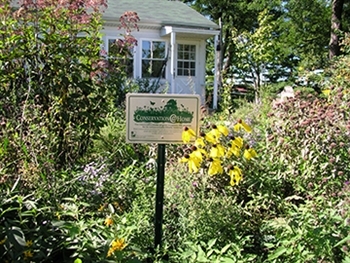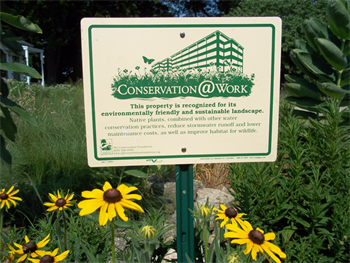
Red Stem Native Landscapes, Inc.
Certification gives property owners visible credit for doing something beneficial for the community, while simultaneously advertising sustainable practices.
 By MPC Research Assistant Caroline Rendon
By MPC Research Assistant Caroline Rendon - August 19, 2014
Yes In My Back Yard is an ongoing series of case studies on stormwater management incentive programs around the U.S. and Canada.
Name of program: Conservation@Home
Location: DeKalb, DuPage, Grundy, Kane, Kendall, LaSalle and Will Counties in Illinois
Organization in charge: The Conservation Foundation, a nonprofit land and watershed conservation organization
Goal of program: Education and empowerment for homeowners to understand their role in maintaining a healthier natural environment
Type of incentive: Certification
Stormwater solutions offered: Education, native plantings, rain barrels
Funding source: Participants pay a fee for inspection, and DuPage County supports The Conservation Foundation’s water quality work, which includes Conservation@Home.
Eligible participants: Conservation@Home is open to any homeowner who wants to bring sustainable practices to their yard and neighborhood
Date started: 2006
Assessment metrics: The Conservation Foundation maintains a database of all participants. Feedback from participants is gathered informally.

The Conservation Foundation
Conservation@Home is a certification program that encourages homeowners to adopt environmentally friendly practices in their yards. Certification requires that homeowners plant native species in their yards, create wildlife habitat and manage a portion of stormwater runoff onsite. To help figure out the best strategies for greening their yards, homeowners can request a yard walk-through by Conservation@Home staff. Homeowners who make required improvements receive a sign from The Conservation Foundation, certifying their yard as environmentally friendly. The sign also gives Conservation@Home an extra publicity boost and contributes to neighborhood-scale adoption of sustainable practices.
Since its inception in 2006, The Conservation Foundation’s Conservation@Home program has certified close to 1,000 homes in the greater Chicago region. By offering educational materials, in-person support and guidance and yard certification, Conservation@Home encourages homeowners to make environmental sustainability happen literally in their own backyards.
Education is at the heart of Conservation@Home: Jim Kleinwachter, who runs the program at The Conservation Foundation, does presentations and trainings throughout the region about sustainable yards. He also stays in touch with the homeowners he meets through the program and often provides advice beyond the initial walk-through. Homeowners value the advice and education they receive from the Foundation, and environmental knowledge can spread quickly between neighbors and friends. Conservation@Home has also franchised its model to partners outside its immediate area so homeowners in Lake County and beyond can seek certification and share sustainable practices with their neighbors.

Red Stem Native Landscapes, Inc.
Conservation@Home has been so popular that Conservation@Work was introduced in 2013. Because businesses, churches and schools occupy large areas of land, encouraging non-residential property owners to adopt sustainable practices can make a big difference. Like Conservation@Home, Conservation@Work encourages adoption of sustainable improvements and certifies workplaces that have made these changes. Certified businesses use native plants in their gardens, retain rainwater onsite and avoid using fertilizers and pesticides.
Word spreads in many different ways. Kleinwachter says that lots of people find out about Conservation@Home because they see certification signs in their neighbors’ yards. Others learn about it through public presentations, organizations like the Rotary Club or landscapers and developers. Often, educating individual participants is the best public relations investment a sustainability program can make!
Lessons learned:
- People are willing to pay for sustainability improvements to their yards, but they often struggle to know what best practices are or how to properly maintain any new additions.
- Many people who participate are those who are already aware of and want to be sustainable. Public education about sustainability and stormwater management is only part of the puzzle! Building relationships with people and communities and establishing programs within organizations that are already well-known and trusted go a long way toward encouraging participation, even among those who wouldn’t otherwise.
- Relationships matter. The Conservation Foundation has been able to grow its Conservation@Home program through partnerships with municipalities, chambers of commerce, homeowner associations and nonprofit organizations.
This post was written by Research Assistant Caroline Rendon.
Want to learn more about other intiatives around the country? Our Yes In My Back Yard series is for you!